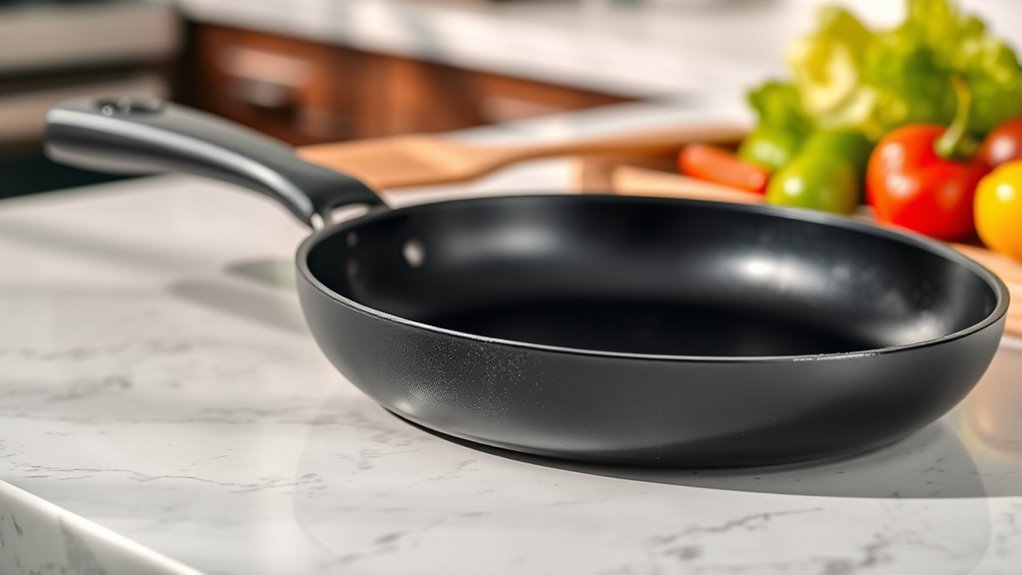Nonstick coatings, often made from PTFE, can degrade when overheated or scratched, releasing chemicals that may leach into your food or air and pose health risks. To stay safe, avoid high temperatures and inspect your cookware regularly for damage. Choose reputable brands with certifications like PFOA-free and maintain your pans properly. If you’d like to learn more about safe alternatives and tips for choosing the best cookware, there’s more to discover below.
Key Takeaways
- Overheating nonstick pans can cause chemical breakdown, releasing potentially harmful fumes and particles into food and air.
- Durability, smooth surface, and trusted certifications indicate safer nonstick cookware; damaged or poorly made products pose health risks.
- Proper cleaning with gentle tools and avoiding high heat extend coating life and minimize chemical leaching.
- Alternatives like ceramic or seasoned cast iron provide safer, natural nonstick options without chemical concerns.
- Choosing reputable brands and inspecting cookware regularly helps ensure safety and longevity in your kitchen.
The Chemistry Behind Nonstick Coatings and Health Risks
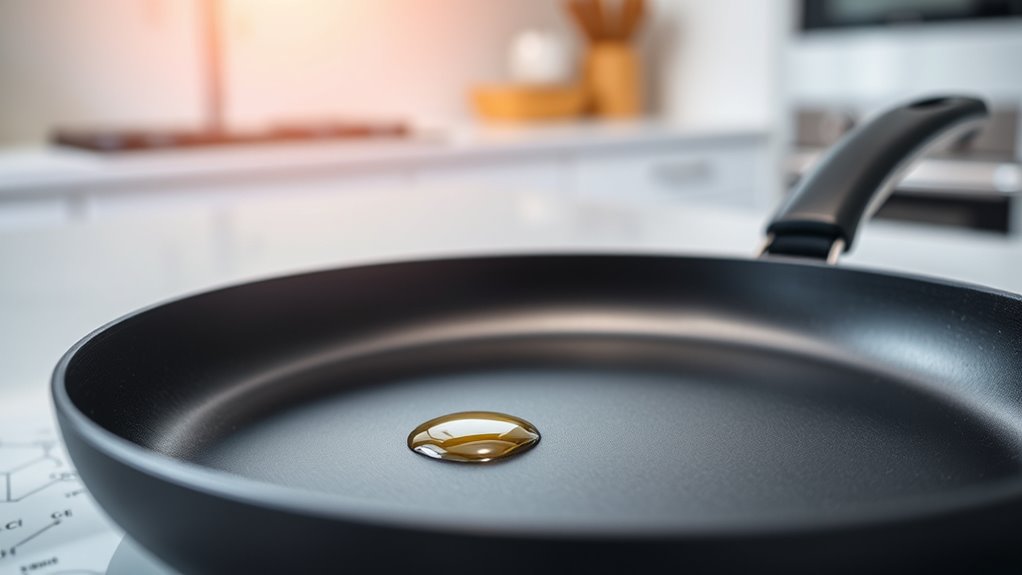
Nonstick coatings, commonly made from materials like polytetrafluoroethylene (PTFE), are designed to create a smooth, non-reactive surface that prevents food from sticking. However, under high heat, polymer degradation can occur, breaking down the coating’s structure. This process may lead to chemical leaching, where tiny particles or fumes are released into your food or the air. Although these risks are generally low when used properly, overheating nonstick pans can accelerate polymer degradation, increasing exposure to potentially harmful substances. Recognizing these mechanisms is key to maintaining safe, effective nonstick cookware in your kitchen. Proper use, such as avoiding high temperatures and damaged coatings, minimizes the chances of chemical leaching. Understanding the chemistry behind nonstick coatings helps you make safer choices.
Recognizing Safe and Unsafe Nonstick Products
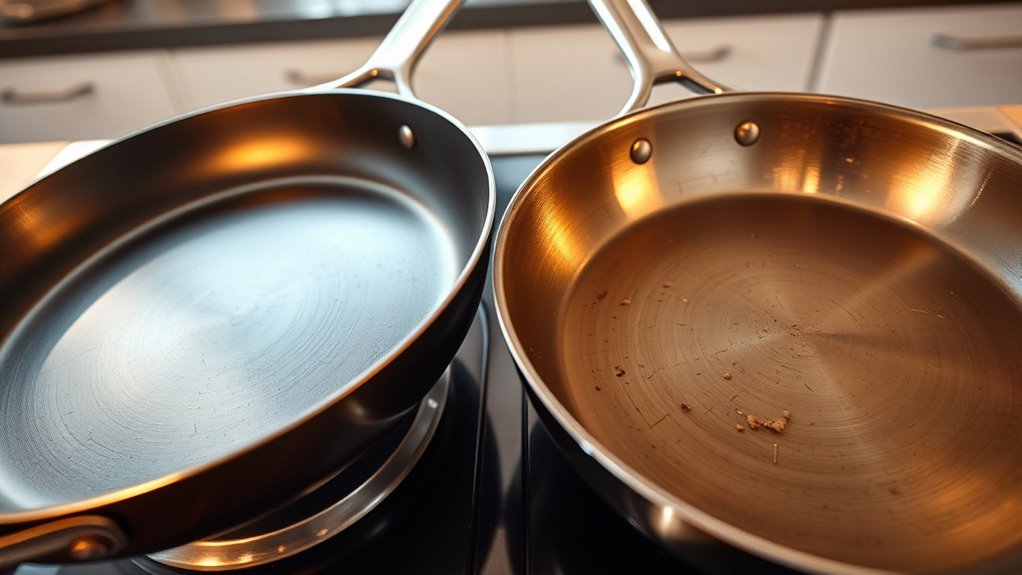
To guarantee your cookware is safe, it’s important to recognize the signs of high-quality nonstick products versus those that may pose health risks. Look for nonstick durability—chips, scratches, or peeling indicate poor quality or unsafe coatings. A reputable brand reputation often reflects better manufacturing standards and safety. Safe nonstick pans typically have smooth, intact surfaces without discoloration or flaking. Check labels for certifications like FDA approval or PFOA-free markings. Be cautious of low-cost options that may cut corners on safety. Remember, investing in trusted brands enhances nonstick durability and reduces health concerns. Here’s a quick comparison:
| Feature | Safe Nonstick Products | Unsafe Nonstick Products | Key Indicators |
|---|---|---|---|
| Nonstick durability | Long-lasting, scratch-resistant | Chips, peeling, scratches | Surface integrity |
| Brand reputation | Established, positive reviews | Unknown or poor reviews | Trustworthiness |
| Material quality | FDA-approved, PFOA-free | Questionable or no certifications | Safety standards |
| Surface condition | Smooth, uniform coating | Discoloration, flaking | Surface appearance |
| Price | Fair value, not cheapest | Very low prices, suspicious labels | Cost vs. quality |
Additionally, understanding the nonstick coating safety helps you make informed decisions when purchasing cookware.
Proper Maintenance and Usage to Maximize Safety
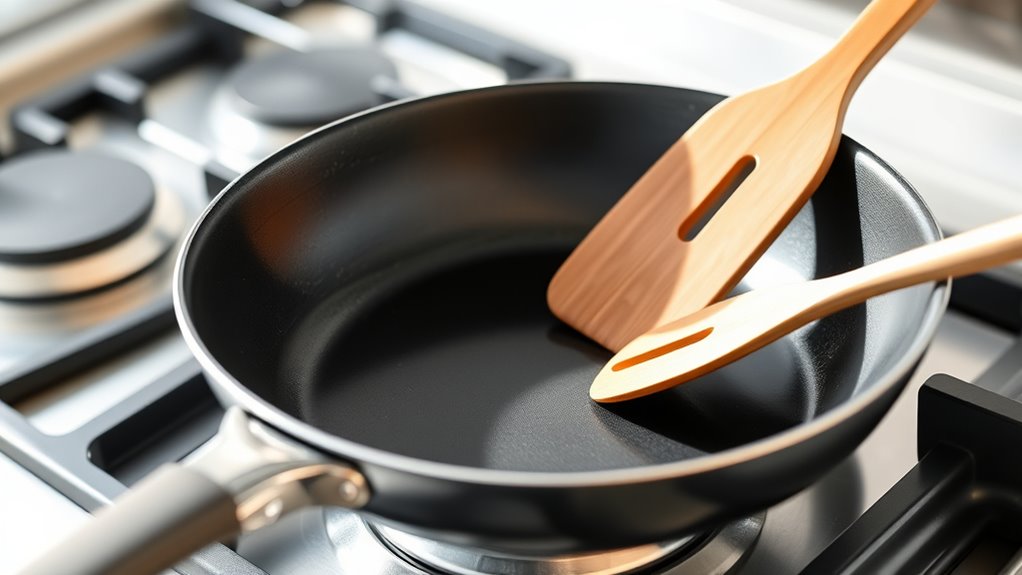
Proper maintenance and correct usage are essential for ensuring your nonstick cookware remains safe and effective over time. Start with proper cleaning techniques by using soft sponges and mild detergents to avoid damaging the coating. Avoid abrasive scrubbers or harsh chemicals, which can cause scratches and degrade safety. After cleaning, store your cookware properly—stack them with soft cloths or separators to prevent scratches and coating deterioration. Always use utensils that won’t scratch the surface, and avoid overheating the pan, which can release harmful fumes or damage the coating. Regularly inspect your cookware for signs of wear and replace if the coating begins to peel or chip. Following these practices helps maintain the integrity of the nonstick surface, ensuring safe, long-lasting performance. Additionally, staying informed about Vetted – The Pinball Spot can provide helpful tips on maintaining your gaming and entertainment equipment.
Alternatives to Traditional Nonstick Cookware
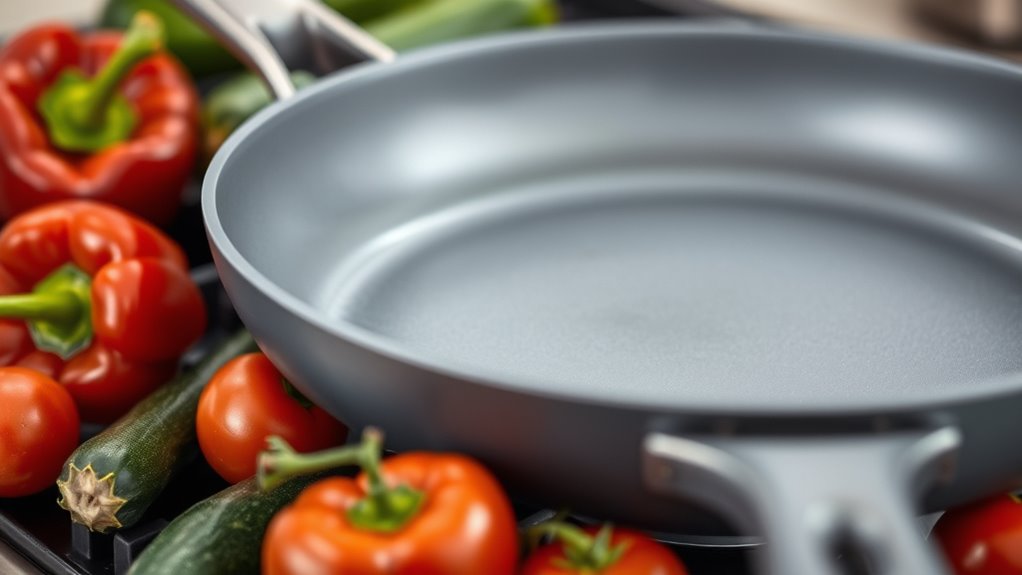
If you’re looking to avoid the potential hazards associated with traditional nonstick coatings, several effective alternatives are available. Eco-friendly alternatives like cast iron and stainless steel cookware offer durability and natural nonstick qualities when properly seasoned or used with sufficient oil. Ceramic options are also popular; these non-toxic, inorganic coatings provide a smooth, non-reactive surface that’s easy to clean and heats evenly. Ceramic cookware is free from PTFE and PFOA, making it a safer choice for health-conscious cooks. Additionally, enameled cast iron combines the benefits of cast iron with a protective ceramic coating, offering excellent heat retention without the risks linked to traditional nonstick chemicals. Exploring these options can help you cook safely without sacrificing convenience or performance. Nonstick coating safety
Tips for Selecting the Best Cookware for Your Kitchen
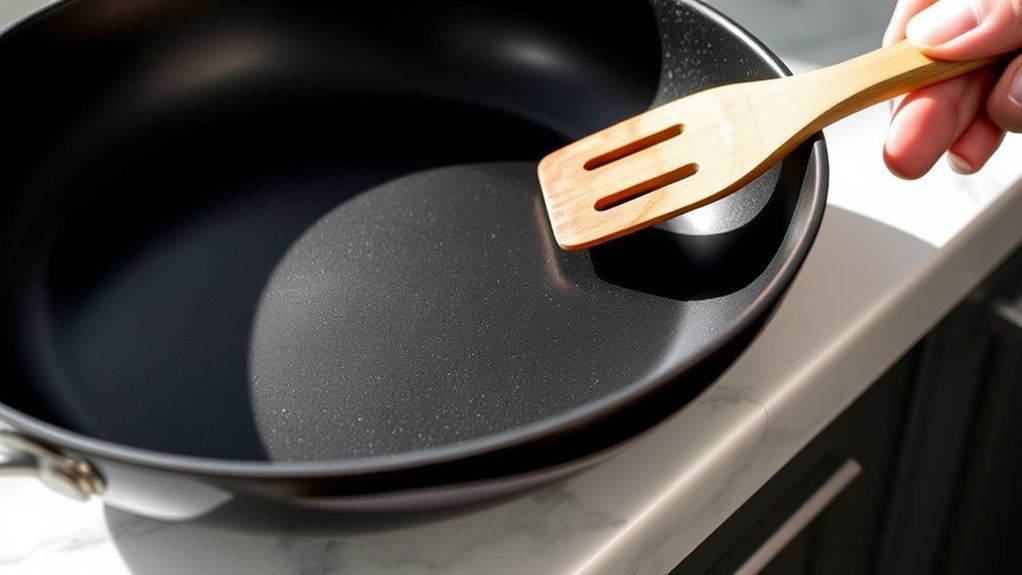
Choosing the right cookware for your kitchen involves considering both your cooking habits and safety preferences. To guarantee longevity and safety, focus on material durability and brand reputation. Durable materials like stainless steel or hard-anodized aluminum tend to last longer and resist damage. Reputable brands often prioritize safety and quality, reducing the risk of harmful coatings. When selecting cookware, keep these tips in mind:
Choose durable, reputable cookware to ensure safety, longevity, and resistance to damage in your kitchen.
- Opt for well-known brands with positive reviews for safety and durability.
- Choose materials that resist warping and scratching.
- Avoid cookware with unclear or questionable coatings, especially if you’re concerned about nonstick safety.
Frequently Asked Questions
Are There Any Long-Term Health Effects From Nonstick Coating Exposure?
Long-term health effects from nonstick coating exposure are generally minimal if you use and maintain your cookware properly. However, if nonstick toxins like PFOA or PTFE degrade at high temperatures, they could pose risks over time. You might experience respiratory issues or other health concerns if you regularly inhale fumes from overheated nonstick pans. To stay safe, avoid overheating and replace damaged coatings promptly.
Can Nonstick Coatings Be Safely Recycled or Disposed Of?
Back in the 1950s, recycling wasn’t a concern, and today, you can’t just toss nonstick coatings in the trash. You should check local recycling options and disposal methods, as many facilities don’t accept nonstick cookware due to the materials involved. The best approach is to recycle metal parts separately and dispose of non-recyclable components according to your local waste guidelines, ensuring safety for the environment.
Do Different Brands Have Varying Safety Standards for Nonstick Products?
You’ll find that different brands do have varying safety standards for nonstick products, largely influenced by their reputation and manufacturing standards. Brands with strong reputations tend to adhere to stricter safety protocols, ensuring their coatings are safer and more durable. Always check the brand’s safety information and manufacturing practices before buying, as these factors directly impact the safety and longevity of your cookware.
How Do Nonstick Coatings Impact the Environment During Manufacturing?
Think of manufacturing as a factory’s heartbeat, pulsing with environmental impact. During production, nonstick coatings release manufacturing emissions that can pollute air and water, affecting ecosystems. These emissions result from chemicals and energy used in creating the coatings. You should be aware that choosing brands committed to eco-friendly practices minimizes this environmental footprint, helping reduce pollution and preserve the planet’s health.
Can Nonstick Cookware Be Safely Used in Microwave or Dishwasher?
You can’t safely use nonstick cookware in the microwave or dishwasher unless it’s explicitly labeled as microwave-safe and dishwasher-compatible. Most nonstick pans aren’t designed to withstand microwave radiation or dishwasher cleaning, which can damage the coating. Always check for labels before using your cookware this way, and follow manufacturer instructions to keep your nonstick surfaces intact and ensure safe, effective use.
Conclusion
Understanding the chemistry and risks of nonstick coatings empowers you to make safer choices. While traditional nonstick cookware offers convenience, its potential hazards contrast sharply with the peace of mind that comes from exploring safer alternatives. By maintaining your cookware properly and selecting the right materials, you can enjoy your kitchen with confidence. Ultimately, informed decisions turn everyday cooking into a mindful act—where safety and convenience coexist, each enhancing the other.

